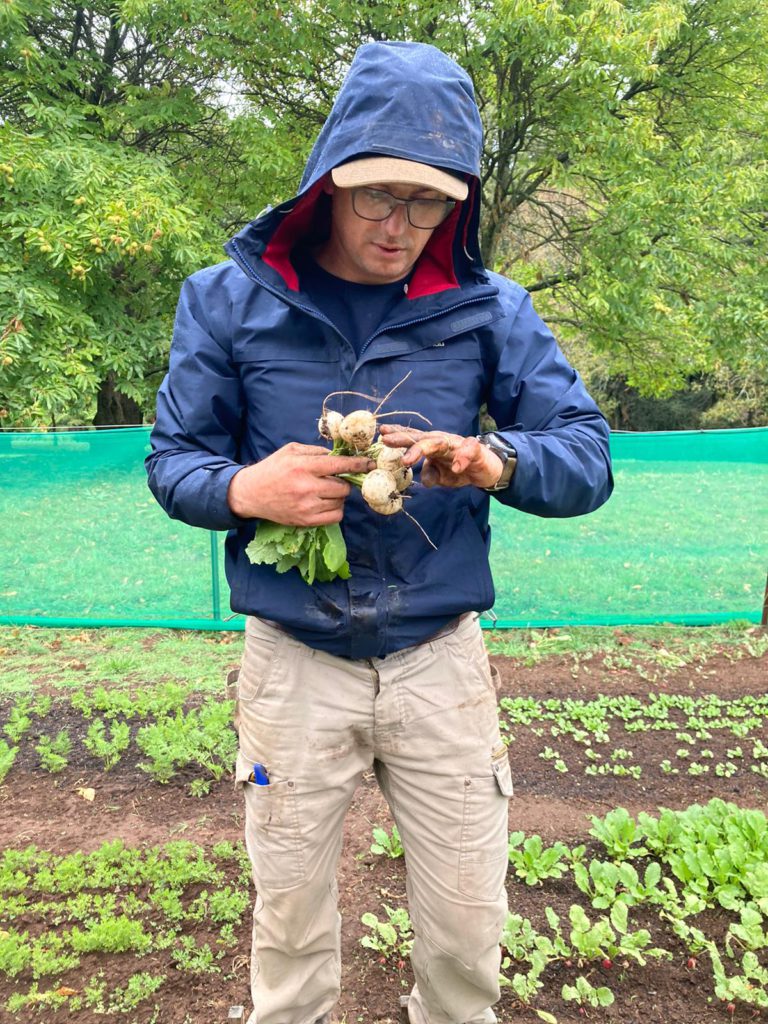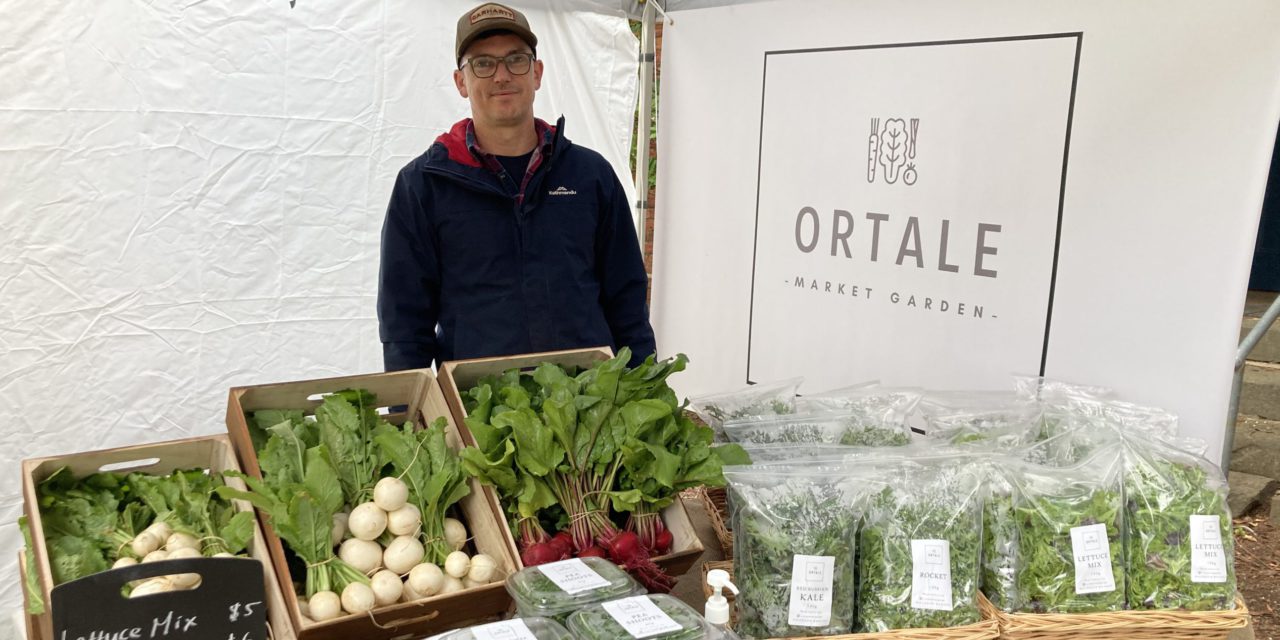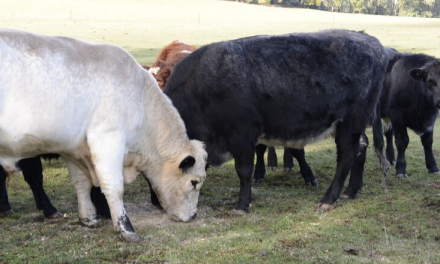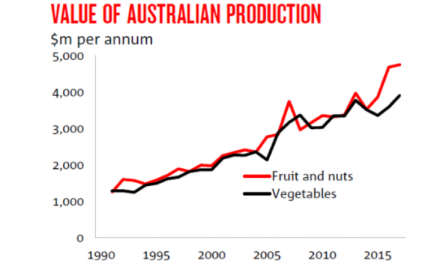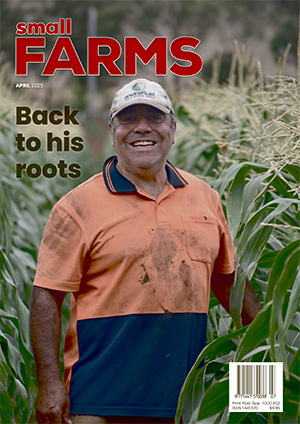After years in retail, always thinking and studying about a life on the land, one man finally realised his dream and got his farm 780m up in the shadow of Mt Macedon — all 1214 square metres of it.
Hands up if you consider yourself a hands-on farmer. Really hands-on. That means no machinery, no farmhands, no chemicals. Just hands. And hand tools.
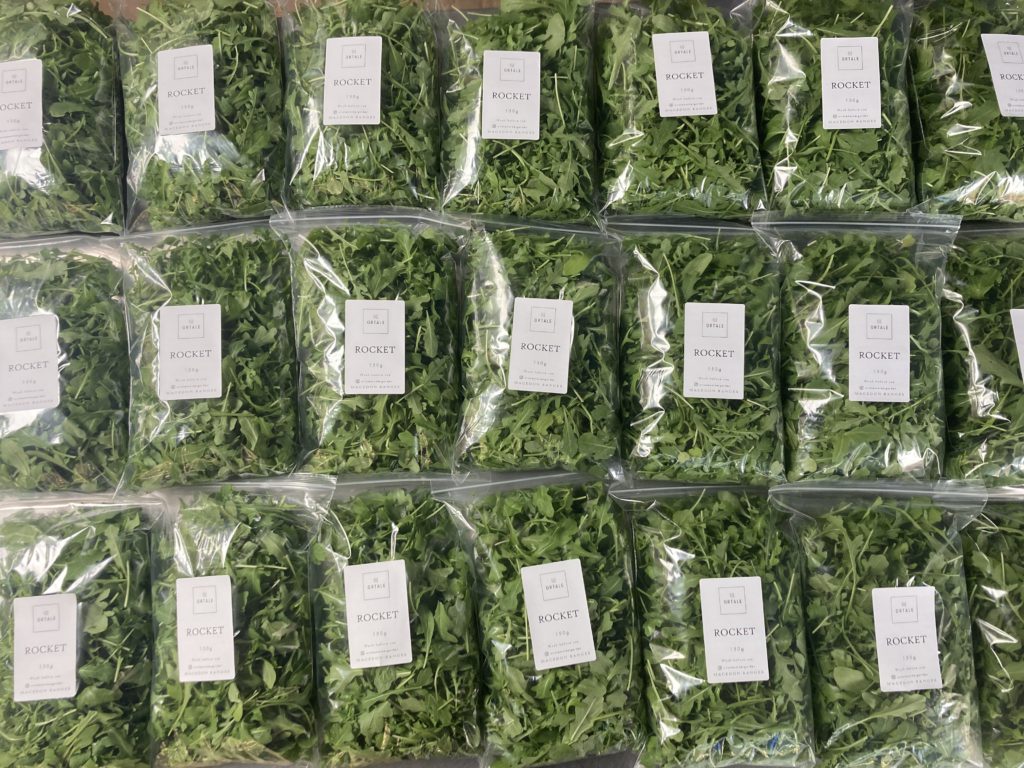
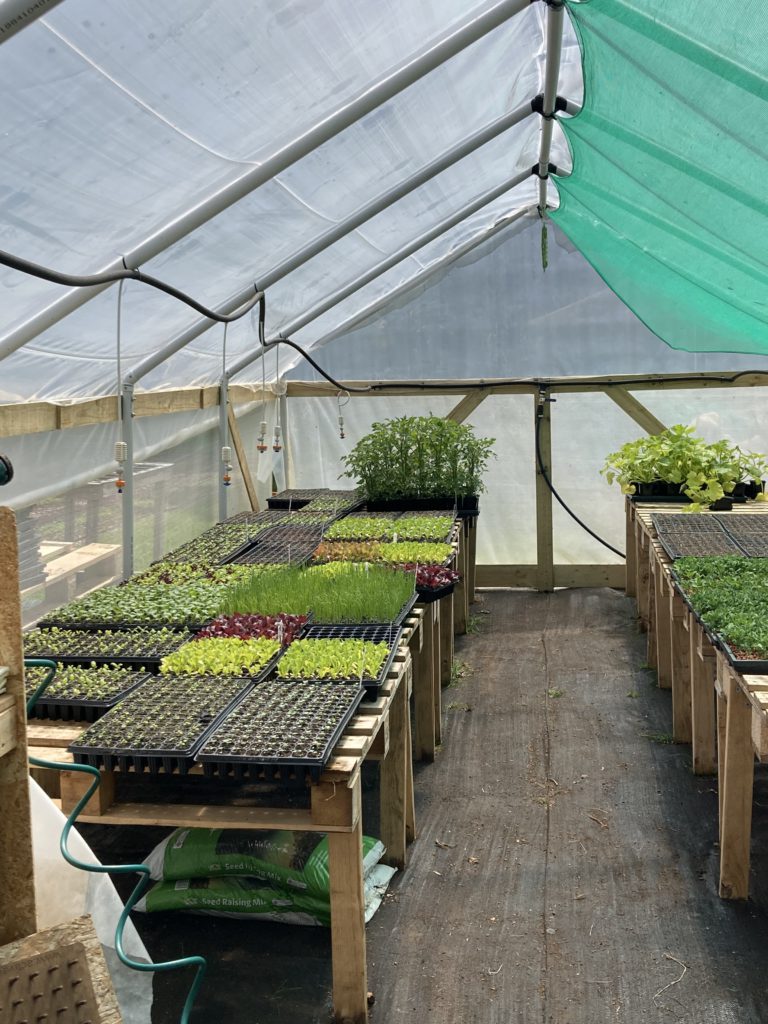
And so you can calibrate your mental computer to what hands-on is all about, allow Small Farms to introduce the benchmark.
Enter Braden Robb.
He’s the driving force behind Ortale (pronounced Or-tah-lay, which Braden says is a culmination of Tuscan and Corsican dialects meaning market garden), a mini Ponderosa of just 1214 square metres (or 0.3 of an acre) in Cherokee, in the heart of the Macedon Ranges and about 75km north of Melbourne.
There, he has established what he describes as a bio-intensive market garden, about which he says “we call ourselves ‘naturally farmed’ as we use only hand tools to work the land and tend the crops”.
Braden said he believed this method of horticulture not only nourished the soil, it also enabled him to help sustain the pristine environment of Cherokee.
“As we produce delicious vegetables every week of the year, in exchange for production we replenish the soil with organic compost, and, as we don’t till, we are able to maintain soil structure and balance — true sustainable farming,” Braden said.
“By only using hand tools to cultivate and grow, we are able to maximise the growing space we can use, set up permanent 75cm beds and minimise soil compaction, all of which aids in maintaining a diverse and active ecosystem of microbial activity and greatly reduces disease and pest pressures.”
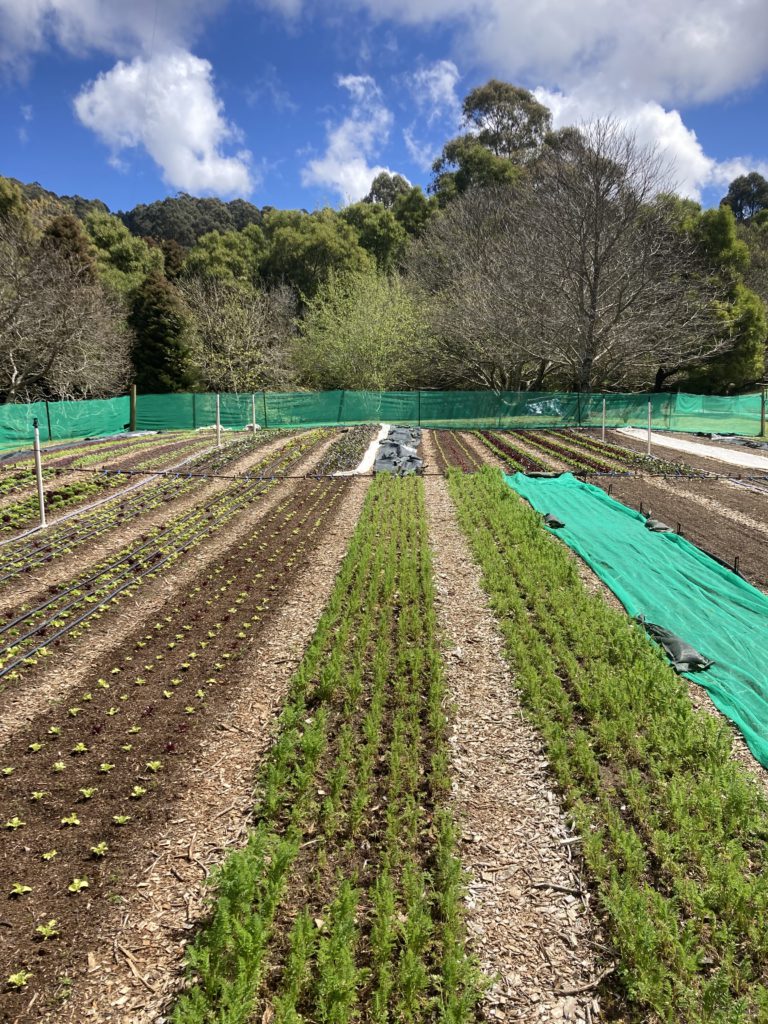
Braden came to farming — incredibly small-scale small farming — almost a year ago, and by a rather circuitous route.
After 13 years in the retail end of the fine wine industry at Prince Wine Store in South Melbourne (he loves every aspect of fine wine — certainly the consumption but most obsessively the viticultural aspect) Braden got a certificate in organic horticulture under his belt and set about chasing the dream.
And the dream was starting a community-focused market garden and applying the skills and knowledge gleaned from studying small-scale farming for the past five years.
“After my wife, Elisa Colaluca, and I bought our first house in Romsey, I thought the timing was just about right to begin the Ortale adventure,” Braden said.
“Not only am I passionate about growing the very best quality food possible for my family, I want Ortale to do the same for the community we are now part of here in the heart of the Macedon Ranges.”
Mind you, Braden has found there are plenty of ‘learning’ moments — any or all of which might have threatened to cool his ardour — except he was simply too flat out to indulge in any self-pity, starting the minute he inspected the little slice of farming heaven he ‘bartered’ from a mate with whom he had worked years ago.
He pays said mate a regular box of vegies for the privilege of being a man on the land.
Despite all the effort and enthusiasm, Braden can do nothing about the weather, and has paid the price for a cold and wet spring.
But the hard work started well before that.
“It has been a lot of work to get the site set up for production because where Cherokee sits behind Mt Macedon we are at 780m and this land simply wasn’t ideal for market gardening — except it comes at a good price,” Braden said with a grin.
“It was just loam, really porous loam, and its pH level of 4.5 was at least 2.0 too low for vegetable production and so were its nitrogen levels.
“So I’ve poured compost, blood and bone, shell grit, a small mountain of lime and a lot of vermiculture processes to try and get it up to scratch — and the pH has reached six and I have been able to lay 68 beds, each 12m long and 75cm wide.”
Braden confesses he has woken up to what he didn’t know he didn’t know when he decided to become a farmer, but if nothing else he is a very quick learner — and he’s gone the whole hog here.
Including burning his bridges behind him — no more off-farm work — so it’s go forward or bust.
You can’t help but admire that kind of confidence, because despite the work the land needed, despite the learning curve and despite the wet spring, our smallest of small farmers reckons his model of farming is absolutely going in the right direction.
Because he has researched, spreadsheeted and modelled it to the nth degree.
“I looked a lot at Canada’s Curtis Stone (the Urban Farmer) and I also checked out a guy in New Zealand who is turning over $250,000 on his half-acre operation and I am huge on data on all the what, where and why of this type of farming,” Braden said.
“And according to my modelling, my spreadsheets and my returns I am already moving to being viable.
“I’ve also got the message that I need tunnels, more tunnels, if I am going to be in the year-round vegetable business. I have installed one but am already planning another three.
“I put up a post on my Facebook page the other day that said “it may be 7.5℃ outside but it’s 19℃ in the tunnel and if I can’t be at market, I can at least get these (vegetables) in. In such a marginal climate and with such erratic and ‘unseasonal’ weather, tunnels become crucial to quality, consistency and growth (along with the countless other benefits — UV stabilisation and less water use for example). This is strongly making me consider tunnels as a vital, viable and necessary option for the field, not only for winter growing but for all four ‘seasons’.”
Seasons being highlighted because Braden has realised living as close to Melbourne as he is, he frequently gets all four seasons in a day.
“What I have also realised about altitude and weather is I only get a short traditional growing season and have got no water,” he said.
“But there are a lot of ways to work around that; such as knowing that drip was essential to keep the plants going, and that includes a liquid seaweed foliar fertigation.”
Because of his determination for no chemicals, Braden’s current pest control strategy is sticky traps to target aphids and white fly and is aided significantly by his location backing onto a national park and the diversity of local birdlife discouraging the aforementioned pests from hanging around too long.
He also has a steady parade of wombats through the beds — they don’t seem to eat anything and he mostly knows they were there because of the footprints each morning.
As well as birdlife, there is also the flourishing local flora, which attracts bees in their droves, solving any pollination challenges Braden may have anticipated.
The other thing he did not anticipate, even in his most enthusiastic of planning moments, was the way his output would take off and how his biggest challenge would not be what to grow, but how fast he could grow it.
“I hadn’t gone into this with a week-by-week maturity plan, but I am spreadsheeting that now and will have a maturity schedule very soon,” Braden said.
“Fortunately because my business is nearly all farmers’ markets at the moment, if I do get a little behind I simply take a week off to let production catch up.
“With my one and only tunnel, I quickly worked out my rocket, for example, matured six weeks faster at the start of spring than it did in the field — it is an incredible safeguard.”
The other trick for Braden was working out what to grow — in the Macedon ranges he is surrounded by greenies and tree-changers and every one of them has a vegie patch in their backyard “and they use it”.
While he has discovered his rocket and salad mix has been a big hit, he has subsequently discovered he needs less than half the parsley he was growing to meet its demand. At a recent market, on a whim, he took 40 bunches of French breakfast radish along with him and it was gone in less than two hours.
Another bonus he has also discovered more by good luck than trial and error is that despite all the drawbacks of farming at 780m there is very little humidity and no frost (except for a rare dusting).
“So you can kiss your downy and powdery diseases goodbye because there’s none of the conditions they need to thrive,” Braden said.
The other skill he has, is he has become quite the handyman.
“I had never built anything before I started this little farm; but necessity has made me an okay Mr Fixit — after all, I went into this with very little and the last thing I wanted was to get into a six-figure debt or worse,” he said.
“I had just built the first tunnel — it’s 2m long — out of galvanised pipe with greenhouse film stretched across it and the area was hit by a mini-tornado. It ripped 100-year-old oaks straight out of the ground but my tunnel survived — off the back of that I have also put up a nursery in the field, made with 40mm PVC piping and cypress fence palings from the hardware store.
“And I built my 2.5m cool room as well.”
Braden might be a babe in the paddock, as it were, but his commitment to quality is immutable.
“I would rather ditch two thirds of a weekly harvest than sell it; I would rather learn to grow it better and not try and pass it off as okay.”
He also knows he owes a lot of his success to Elisa, who continues to work as a teacher and that gives him some financial wiggle room as nearly every penny he brings home from markets is being reinvested in Ortale — and their combined future — as they are planning to eventually get a bigger piece of land of their own.
Until then he will keep going around his market circuit of Macedon, Lancefield, Kyneton and Riddell’s Creek — and is about to launch weekly vegie boxes in his local area, hoping initially to do 25 to 30 a week.
And does Braden Robb have any advice for people interested in following in his footsteps?
Absolutely.
“Do an internship first.”
